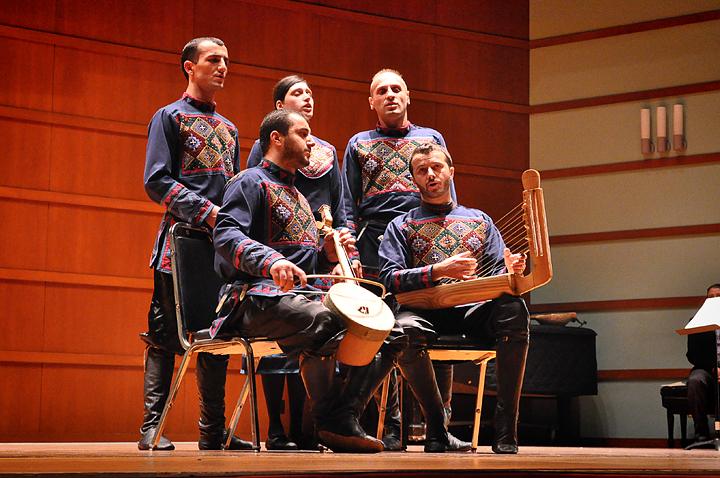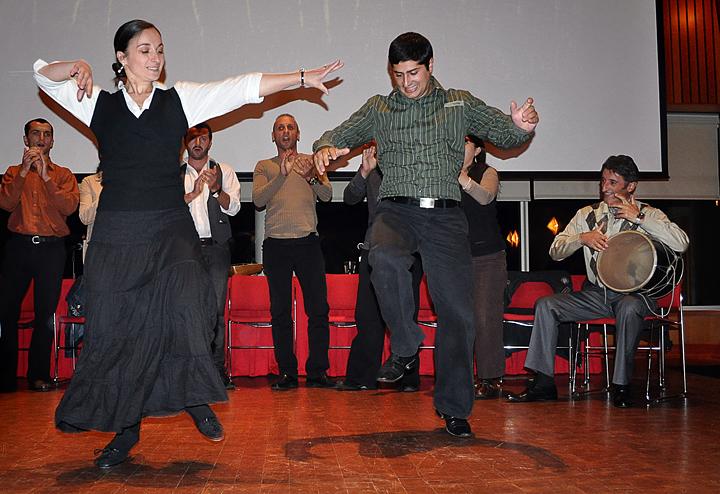America has become somewhat of a mono-culture. Here, grinding constitutes dancing and music has become a realm where only the super-famous have their voices heard. While the top 20 artists certainly have their place, if more attention is not paid to the folk, alternative and historic music of the world, the mono-culture will begin to compound itself. This week’s workshop and concert with Zedashe—a Georgian ensemble—shows that it is still possible to preserve and cherish the ancient, and sometimes obscure, music of this world.

The ensemble was formed 15 years ago by a brother and sister who were working to learn, master and preserve the ancient ministerial chants and folk music of the Republic of Georgia. Their goal was to promote and expand this period of music, which was largely lost during Soviet rule.
The ancient chants of Georgia are first and foremost the sounds of celebration, beauty and heritage. Georgia, because of its location on the border between Russia and Turkey, has experienced a seemingly constant attack on its culture, and music in particular. Many outside forces, especially Russian, have used the power of their folk and religious music as a propaganda tool. But through it all the Georgian people have held steadfast to their original music.
“There was something specific about the Georgian harmonies and the Georgian tradition of chanting that touched the Georgians hearts,” said John Wurdeman, an ethnomusicologist working with the ensemble.
During the workshop on Tuesday, Zedashe explained where they drew their inspiration from, beginning with monasteries.
“They were…resurrecting the ancient medieval chants. They were going to the museum of the manuscripts, museum of old nodal systems, learning from monks and nuns who had the tradition passed on orally. They were trying to learn this music, put it into their notation system and then circulate it as the Soviet regime was stalling out,” Wurdeman said.
Then the ensemble reached out to rural villages, gaining more songs and background.
“They traveled to the highlands and the mountains [to learn from the village elders]. Unfortunately now, many of the people [we] learned songs from have already passed away—these were the elders in the villages,” Wuderman said. “Fortunately Zedashe was able to visit them, record these songs, document them and start teaching them to other people. [Without Zedashe] many of the elders would have taken them to the grave with them.”

Zedashe has recorded and preserved thousands of ancient songs, which would have been lost without their intervention. They currently have an archive of 6,000 songs and dances. Much of these archives are thanks to Grinnell’s own Claire Griffith ’12.
“Claire was instrumental in helping us. She came on a program to study Georgian music and was very touched by her experience. She called us up later and [asked] what she could do to help. We said that we have box after box of archival material that was not organized and Claire was kind enough to create a system and digitally organize it all for us,” Wurdeman said.
For the past two years Griffith has been working to bring the group to Grinnell as part of a U.S. tour.
After Monday’s workshop, Zedashe performed a formal concert on Tuesday in Sebring-Lewis Hall. The concert offered a glimpse into the world of Georgian folk music.
“Zedashe’s concert on Tuesday was everything I expected and a total surprise at the same time.” said Ellie Honan ’14, an audience member.
The first act combined trio chants, full ensemble pieces and dancing and instrumental pieces. Wurdeman described many of the songs as medieval, full of lust and battle, yearning and sorrow.
The deeper voices began first, and as each subsequent voice entered, a frustration and intrigue took hold. The music is unlike anything heard in Western culture and confuses the western-trained ear. It sounds out of tune until the harmony clicks, and then the blend makes sense. However as the building of the voices continued, a scene is set even when you cannot understand the words. The dancers leapt onto the stage and used facial expressions that further explained the scene.
The dances were flirtatious, provocative and so well-executed that it was like the dancers’ feet were playing a game of tag—chasing and retreating, flying and falling.
“This was the best performance of traditional, real folk music I have ever seen. Folk music troupes in Georgia today are performing on the global stage. The idea of a folk music is lost to most people, so the work that [Zedashe] is doing is very good, very important,” said Aka Khipashvili, an international student from Georgia.“This is the actual face of how Georgian music sounds. I felt really proud when I was at the performance. And the dancing was … really good.”




























































